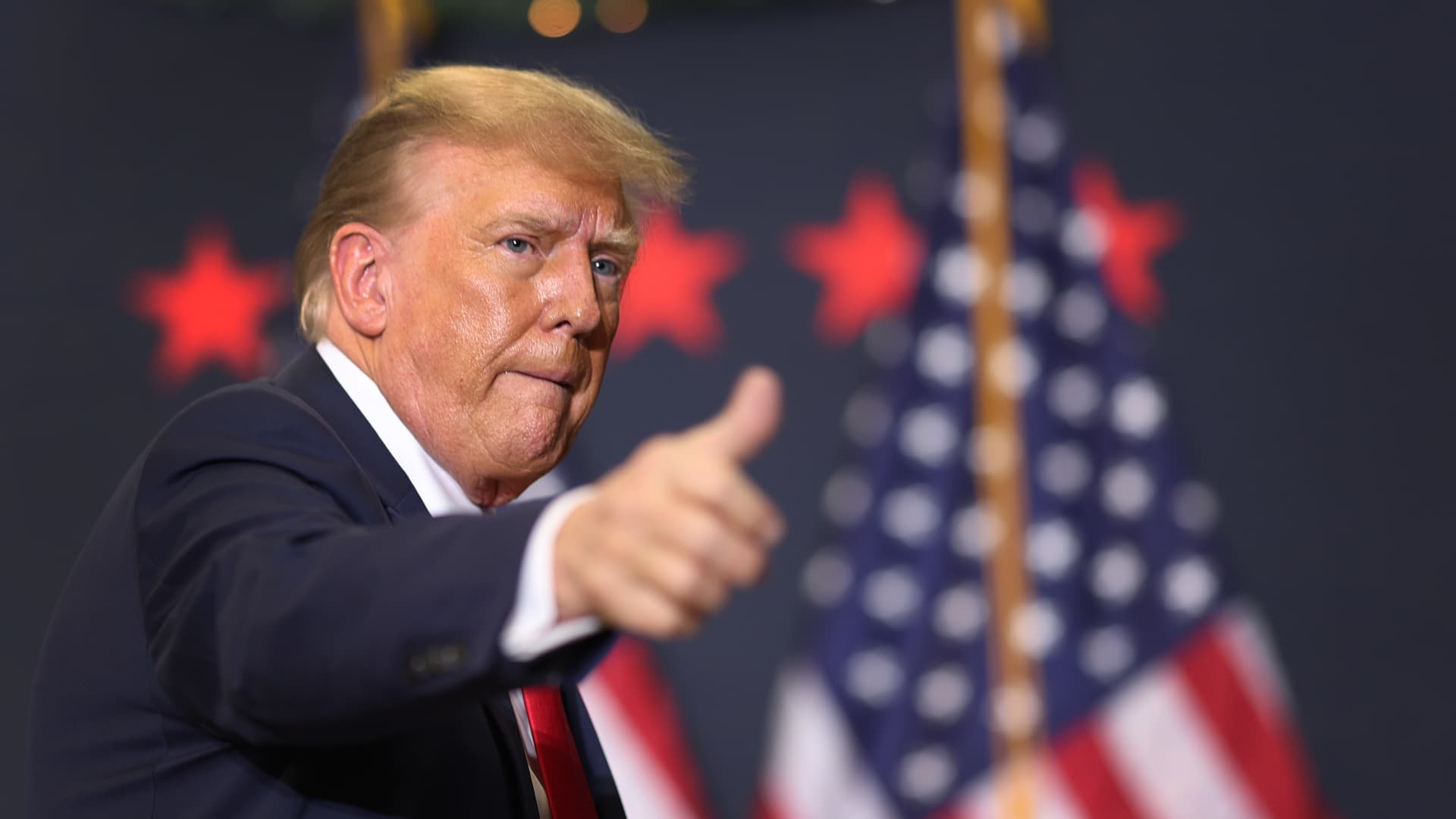2024 is set to be a major election year, with over 75 countries heading to the polls. The Economist Intelligence Unit says that more than four billion people — or over half of the world’s population — live in countries with elections expected this year. These range from the U.K. and the U.S., to Russia, India, Turkey and beyond. “I think any election is interesting right now, and we know that because of what happened in 2023,” Steen Jakobsen, chief investment officer at Saxo Bank, told CNBC Pro, referencing the election outcome in Argentina . The country surprised markets by voting in Trump-admiring populist Javier Milei — along with his radical economic policies — by a wider-than-expected margin. Steen expects more of the same this year: “For 2024, it seems that most of the voters are looking for anti-establishment.” While it’s hard to predict how elections will impact markets, analysts say the votes in key markets such as the U.S. are, of course, the ones to watch. “The outcome of the elections will probably only affect the domestic stock markets in most countries,” Lawrence Loh, business school professor at the National University of Singapore (NUS), said. “The big one that everyone is watching is the U.S., but it is also hard to say how that will swing markets because it is happening in almost a year’s time,” added Loh, who is also a director at the university’s Centre for Governance and Sustainability. CNBC Pro did a deep dive into five elections — Taiwan, Indonesia, India, the United Kingdom, and the United States — to assess how the potential outcomes could affect both domestic and global stock markets. Taiwan Coming up on Jan. 13 is Taiwan’s presidential elections , which will see a three-cornered race between the ruling Democratic Progressive Party (DPP) candidate Lai Ching-te and opposition members Ko Wen-je of the Taiwan People’s Party and Hou Yu-ih from Kuomintang. The outcome has the potential to impact testy U.S.-China relations and even security in the Asia Pacific region more broadly. For instance, DPP’s Lai has pledged his support for Taiwan’s independence. As for any impact on the local stock market, NUS’ Loh thinks it would be minimal. “I think the impact will not be that strong — but then it may affect some of the bigger companies’ performance because of the impact on relations with China,” he said. Taiwan Semiconductor Manufacturing Company — a key stock on investors’ radar in 2023 — is one such company. However, Loh said that any impact is unlikely to be material given that the company generates revenue across several geographies. Indonesia Hot on the heels of Taiwan’s elections is another three-way vote in Indonesia scheduled for Feb. 14. The presidential candidates are current Defense Minister Prabowo Subianto — with controversial running mate Gibran Rakabuming Raka, son of outgoing President Joko Widodo — the governing party’s Ganjar Pranowo, and former governor of Jakarta, Anies Baswedan. NUS’ Loh believes the outcome of the election could impact the willingness of big companies — such as automaker Tesla — to set up shop in the Southeast Asian nation . The inflow of foreign investment is key for the country, which is home to several key tech companies and unicorns, many of which are in the process of deciding when and where to list. Higher economic activity with investments from abroad could potentially spur the companies to list on the Indonesian Stock Exchange, he added. India India proved popular among investors in 2023 , thanks to its strong economy, growing population and booming stock market. However, the country’s slated election has “potential binary outcomes [which] sets the market up for volatility,” according to Morgan Stanley. In a Nov. 12 research note called “A Year of Volatility,” the bank’s analysts wrote that their base case expectation is that Indian equities will rise in the lead-up to the 2024 general elections, “as the market is likely to price in continuity and a majority government.” They are looking positively at several companies including insurer SBI Life Insurance and technology consulting giant Infosys . The country heads to the polls between April and May. In its elections in 2019, Prime Minister Narendra Modi won a second term by a landslide and NUS’ Loh expects the incumbent leader to win again – a move that he says could prove beneficial to both the country’s economy and stock market in the longer term. United Kingdom Over in Europe, the United Kingdom is due to head to the polls before Jan. 28, 2025, although an election is widely expected in 2024. In a December note, Pantheon Macroeconomics Chief U.K. Economist Samuel Tombs said that the ruling Conservative Party remains about 20 points behind rival Labour in polls of voting intentions, “so the political pressure on [Chancellor Jeremy] Hunt to bribe voters [with tax cuts] is intense.” However, he also noted that tax cuts are unpopular if they also push up mortgage rates — as seen in the Conservative’s popularity slump following 2022’s disastrous mini-budget — and “accordingly, we do not expect large tax cuts in the Budget.” For Lindsay James, investment strategist at Quilter Investors, “the image of the [Conservative] party at least in the eyes of the investment community has been somewhat tarnished by the [mini-budget] fallout.” “So given the Labour party have moved to the centre ground, marked themselves out with a green industrial policy and abandoned much of their previous Corbyn era manifesto of nationalisation, and anti-business mentality — investors are I think a lot more comfortable about a potential change in the halls of government,” she said in notes to CNBC. Saxo’s Jakobsen says it is hard to predict the impact of the election on U.K. stocks, but sees companies in the defense and cybersecurity sectors benefiting from any boost in economic stimulus measures. United States There’s no doubt that the U.S. presidential election will dominate investors’ attention, however, given the potential for global market moves, especially if former President Donald Trump is reelected. “I think [investors] rightly fear what would happen if Trump came into office, because the first time, Trump was listening to outsiders. This time, he’s going to come with a full market agenda … I don’t think they would necessarily be market-friendly,” Saxo’s Jakobsen said. BNP Paribas Chief U.S. Economist Carl Riccadonna, in a December note, said that early opinion polls are “notoriously unreliable,” and “there are unique circumstances which could impair the presumed frontrunners of both major parties, Joe Biden and Donald Trump.” He noted that there was an elected risk of a third-party candidate “serving as a spoiler – not winning, but tilting the scales.” The bank said the presidential race currently looks too close to call and a divided government seems likely, which could be welcomed by markets. “Typically, financial markets view the checks and balances of divided government favorably. One-party control of the White House and Senate would give the president greater sway over Fed and Supreme Court picks. The president can significantly affect trade and tariff policy alone,” Riccadonna added. Looking beyond the candidates, Sam Stovall, chief investment strategist at CFRA Research , assessed how markets have reacted in previous election years — and struck a positive tone. “Investors should expect a good year, because historically, we’ve had positive returns in the presidential election year of first-term presidents with a very high frequency of a gain and an abnormally high return,” he said. — CNBC’s Katrina Bishop, Clement Tan and Sarah Min contributed to this report.
It’s a big election year around the world. Here’s where the pros are watching
Related Posts
RECENT POSTS
Browse by Category
- Books (1)
- Business (3,596)
- Events (2)
- Fashion (5,632)
- Horror (1)
- Interviews (28)
- Movies (5,628)
- Music (5,663)
- News & Gossip (6,310)
- Television (5,661)
- Uncategorized (1)
- Video Of The Day (914)
POPULAR POSTS
READERS' PICKS
EDITOR'S PICKS
© 2022 EssentiallyHollywood.com - All Rights Reserved


























































![Mason Ramsey – Twang [Official Music Video] Mason Ramsey – Twang [Official Music Video]](https://i.ytimg.com/vi/xwe8F_AhLY0/maxresdefault.jpg)




















